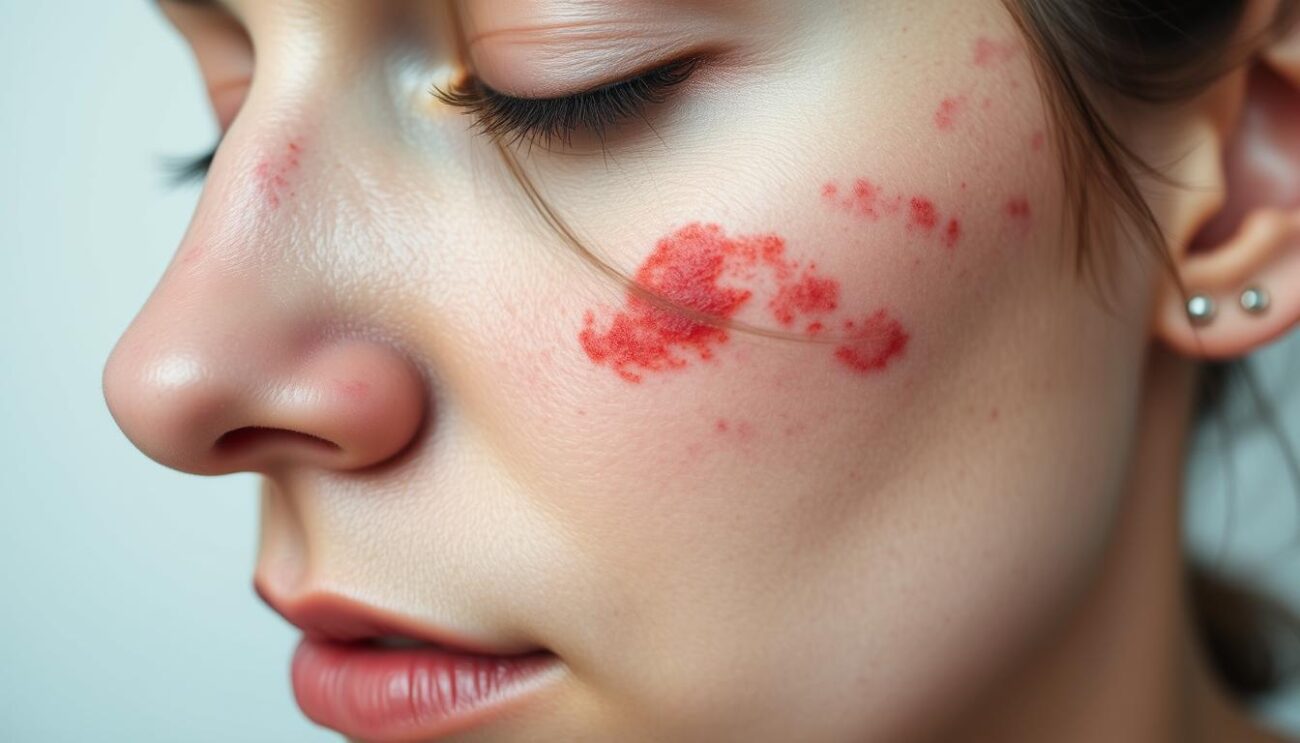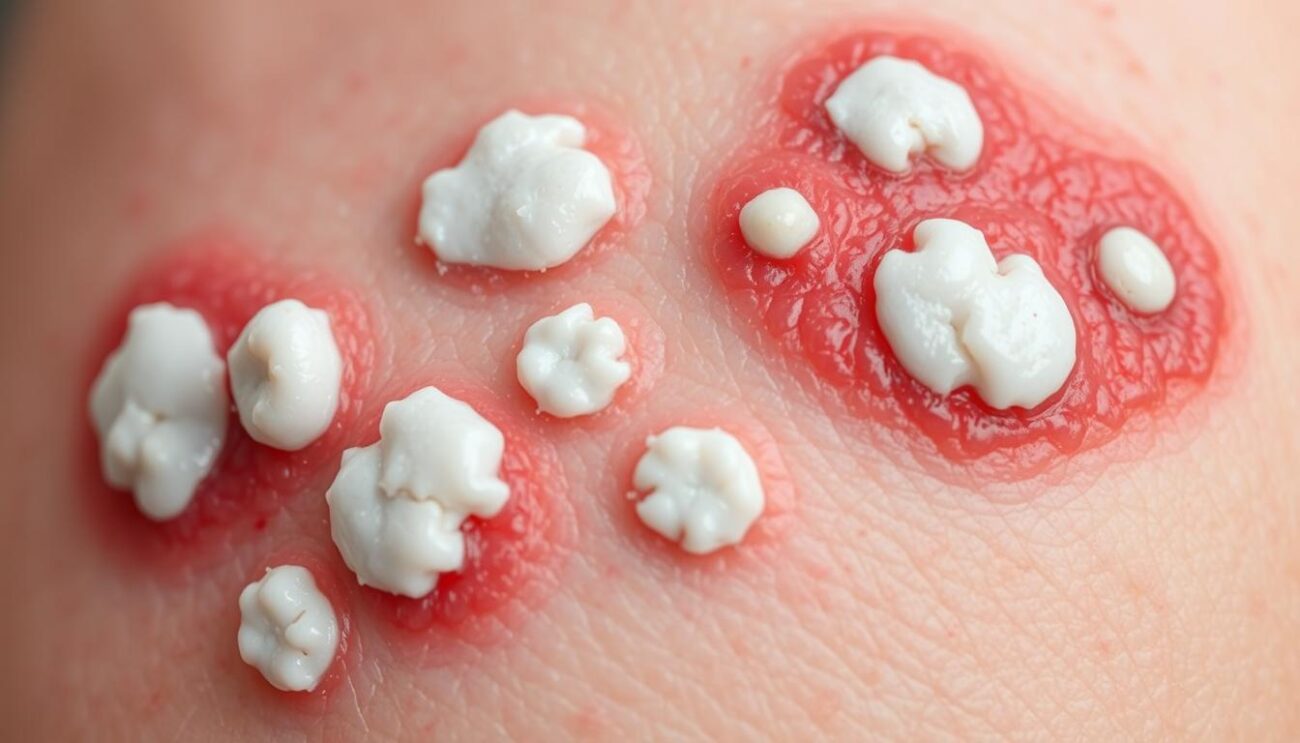Opzelura is a topical cream used for atopic dermatitis. Before you try it, knowing the opzelura side effects and safety concerns is key. What risks and precautions should you be aware of with Opzelura?
Key Takeaways
- Opzelura may increase the risk of serious infections, certain cancers, and immune system problems.
- Cardiovascular events, blood clots, and low blood cell counts are also potential side effects of Opzelura.
- Close monitoring by a healthcare provider is necessary when using Opzelura, especially for individuals over 50 with heart disease risk factors.
- Opzelura is indicated for the treatment of nonsegmental vitiligo in individuals aged 12 and older.
- Proper application and precautions are essential when using Opzelura to minimize the risks.
What is Opzelura?
Indication and Usage
Opzelura is a prescription medicine for the skin. It treats mild to moderate eczema in adults and kids 12 and older. It’s for those who don’t get better with other skin treatments.
Using Opzelura with certain medicines is not advised. It’s not tested in kids under 12 for eczema treatment.
Opzelura also helps with nonsegmental vitiligo in adults. It controls the immune system and reduces skin inflammation.
- Opzelura is approved for the short-term and non-continuous chronic treatment of mild to moderate eczema in adults and children 12 and older.
- It is not known if Opzelura is safe and effective in children under 12 with eczema.
- Opzelura is also indicated for the treatment of nonsegmental vitiligo in adults.
“Opzelura is a valuable treatment option for individuals struggling with eczema or vitiligo, providing a targeted approach to managing these skin conditions.”
Opzelura Side Effects: Serious Infections
One major worry with Opzelura is the chance of serious infections. It contains ruxolitinib, a drug that weakens the immune system. This makes it harder to fight off infections.
In studies, some users of Opzelura got serious infections. These included opzelura tuberculosis and opzelura serious lung infections from bacteria, fungi, or viruses. These infections can spread and sometimes cause hospitalization or death.
- Careful monitoring for signs and symptoms of tuberculosis (TB) is crucial during Opzelura treatment.
- Opzelura should not be used in individuals with an active, serious infection, including localized infections.
There have also been cases of serious lung infections, like pneumonia, linked to Opzelura. Patients need to watch for any signs of lung problems while using this drug.
“Some people have had serious infections while taking JAK inhibitors by mouth, including tuberculosis (TB), and infections caused by bacteria, fungi, or viruses that can spread throughout the body. Some people have been hospitalized or died from these infections.”
Healthcare providers must weigh the risks and benefits of Opzelura. This is especially true for patients with a history of infections or conditions that make them more likely to get serious infections.
Cancer and Immune System Problems
Increased Risk of Certain Cancers
OPZELURA may raise your risk of some cancers. Studies show that users of JAK inhibitors, like OPZELURA, face a higher risk of lymphoma and lung cancer. This is especially true for smokers, both current and past.
Some people also get skin cancers while on OPZELURA. Your doctor will watch your skin closely during treatment. It’s key to stay out of the sun and wear sunscreen and protective clothes when outside.
The cancer risk with OPZELURA comes from how it affects the immune system. It’s vital to talk about the opzelura cancer risk, opzelura lymphoma, opzelura lung cancer, and opzelura skin cancer risks with your doctor before starting treatment.
| Cancer Type | Increased Risk |
|---|---|
| Lymphoma | Yes, especially in current or past smokers |
| Lung Cancer | Yes, especially in current or past smokers |
| Skin Cancer | Yes, regular skin monitoring is recommended |
“People taking JAK inhibitors by mouth have a higher risk of certain cancers including lymphoma and lung cancer, especially if they are a current or past smoker.”
opzelura side effects
While Opzelura is used for mild to moderate eczema in adults and kids 12 and up, it’s key to know its side effects. Studies show common side effects include:
- Common cold (nasopharyngitis)
- Diarrhea
- Bronchitis
- Ear infection
- Increase in a type of white blood cell (eosinophil) count
- Hives
- Inflamed hair pores (folliculitis)
- Swelling of the tonsils (tonsillitis)
- Runny nose (rhinorrhea)
After six months, more side effects were seen. These included acne, itching, headaches, and infections. These issues were similar to the first year’s side effects.
| Side Effect | Incidence |
|---|---|
| Common cold (nasopharyngitis) | 8.4% |
| Diarrhea | 6.1% |
| Bronchitis | 4.9% |
| Ear infection | 4.6% |
| Eosinophil count increase | 4.2% |
Opzelura should not be used with certain drugs. This includes biologics, JAK inhibitors, or strong immunosuppressants. Doing so can lead to serious side effects.
Cardiovascular Risks
Increased Risk of Major Cardiovascular Events
Using Opzelura, a topical cream, may raise the risk of heart attack, stroke, or death. This is especially true for people aged 50 and older with heart risk factors. It’s also a concern for those who smoke or have smoked before.
Even though Opzelura is applied to the skin, it can still be absorbed by the body. This could increase the risk of serious heart problems. It’s important for patients and doctors to watch for any signs of these risks while using Opzelura.
| Cardiovascular Risk | Opzelura Users | General Population |
|---|---|---|
| Heart Attack | Increased risk | Average risk |
| Stroke | Increased risk | Average risk |
| Cardiovascular-related Death | Increased risk | Average risk |
It’s vital for Opzelura users to talk about these heart risks with their doctors. They should report any symptoms that worry them right away. Keeping an eye on heart health and managing it well can help lower these risks.
Blood Clots and Low Blood Cell Counts
Using Opzelura can raise the risk of blood clots in the legs or lungs. This is a serious issue, especially for those 50 and older with heart disease risk factors. They are more at risk when taking JAK inhibitors like Opzelura.
Opzelura can also lead to low blood cell counts. This includes low platelets, red blood cells, and white blood cells. These changes can make it harder for the body to fight off infections and clot blood properly.
- Patients 50 years and older with at least one heart disease risk factor have a higher risk of blood clots and death when taking JAK inhibitors like Opzelura.
- Opzelura may increase the risk of serious, even life-threatening, blood clots in the legs (DVT) or lungs (PE).
- Opzelura can cause low platelet, red blood cell, and white blood cell counts, which can impact the body’s ability to fight infections and clot blood properly.
Healthcare providers need to watch patients on Opzelura closely for signs of blood clots or changes in blood cell counts. If you notice swelling, pain, or discoloration in your legs, or if you have shortness of breath, tell your doctor right away.
Safety Considerations
Using Opzelura comes with some safety concerns. It has been tested in kids as young as 12, but its safety in younger kids is still unknown. Always use Opzelura on the skin only and avoid the eyes, mouth, and vagina.
It’s important to think about how Opzelura might affect your body’s ability to fight off infections. If you have an active infection, it’s best to avoid using Opzelura to protect your immune system.
There’s also a higher risk of death in people over 50 with heart disease risk factors and taking JAK inhibitors. This is something to consider if you’re in this age group and using Opzelura.
When using Opzelura, stay out of direct sunlight as much as possible. Wear protective clothing and use sunscreen with a broad spectrum. This helps prevent skin reactions from increased sun sensitivity.
Talk to your doctor before starting Opzelura. Share your medical history, including infections, diabetes, lung disease, and heart conditions. Your doctor will decide if Opzelura is safe for you.
If you notice any serious symptoms like infection signs, heart attack, or stroke, get medical help right away. In the U.S., call the FDA at 1-800-FDA-1088 or visit www.fda.gov/medwatch. In Canada, contact your doctor and report side effects to Health Canada at 1-866-234-2345.
Precautions and Monitoring
Before starting Opzelura, talk to your doctor about your health history. Tell them about any ongoing infections. Also, share if you have diabetes, chronic lung disease, HIV, or a weakened immune system.
Let your doctor know if you’ve had shingles, hepatitis B or C, or traveled to areas with high fungal infection risks. If you have a history of cancer or smoke, tell them too. Inform your doctor about heart issues, high cholesterol, or low blood cell counts.
After starting Opzelura, watch for signs of infection, heart problems, or blood clots. Call your doctor right away if you notice any symptoms.
Regular Monitoring Needed with Opzelura
- Watch for signs of infection, like fever, chills, or flu-like symptoms.
- Get blood tests regularly to check blood cell counts and cholesterol.
- Look for new or changing skin lesions, which could be skin cancer.
- Talk to your doctor about any health concerns or changes.
Following the recommended precautions and monitoring is key for safe Opzelura use. Keeping open communication with your healthcare provider is crucial for the best treatment outcomes.

Conclusion
Opzelura (ruxolitinib) can help those with mild to moderate eczema. But, it’s key to know about its side effects. It’s usually safe but can raise the risk of serious issues like infections and cancers.
Before starting Opzelura, talk to your doctor about the risks and benefits. Watch for any side effects closely. Taking steps like avoiding too much sun and reporting infections quickly is important.
Opzelura can be a good choice for managing eczema. But, it needs careful use and monitoring. This ensures it works well and keeps you healthy.







